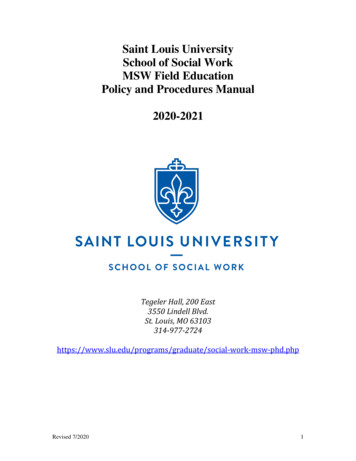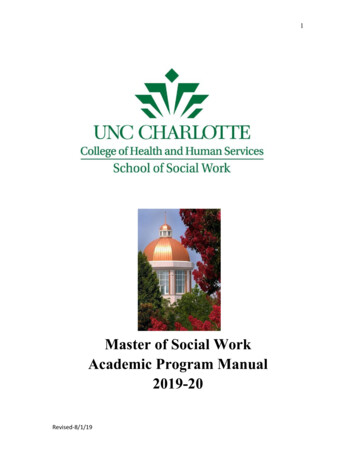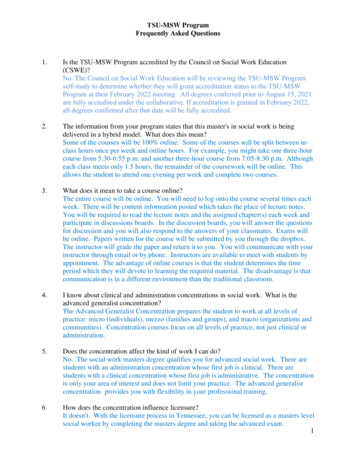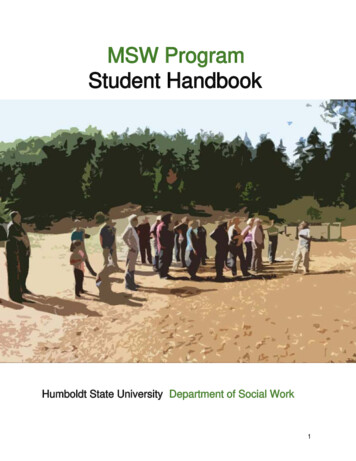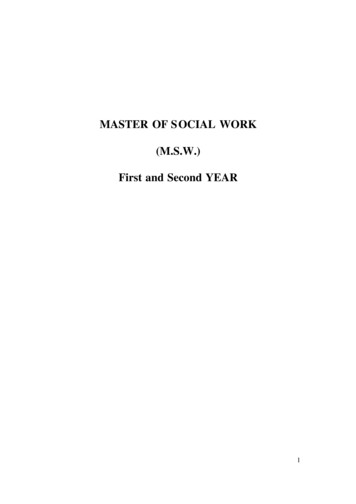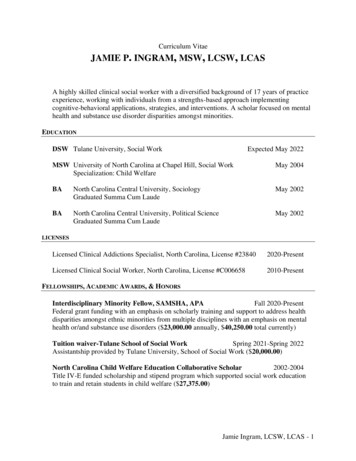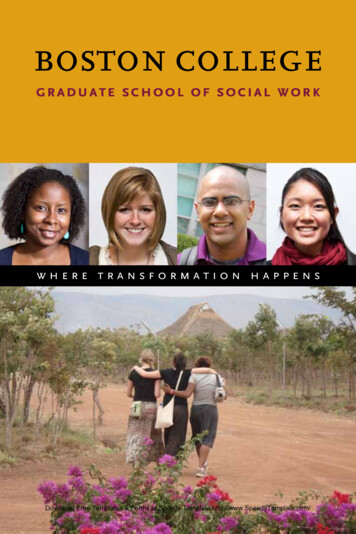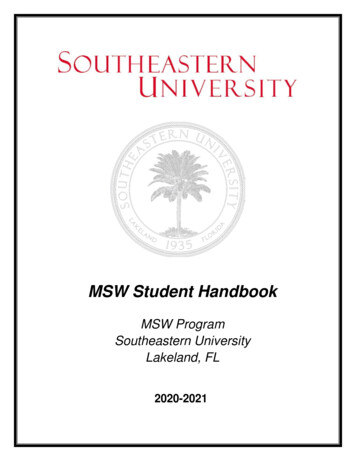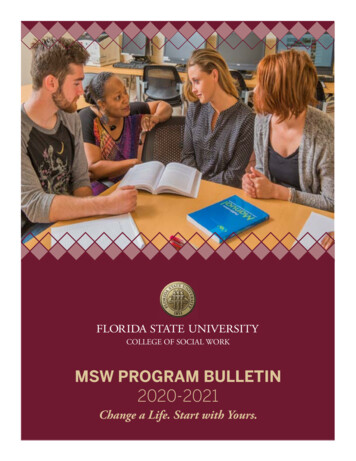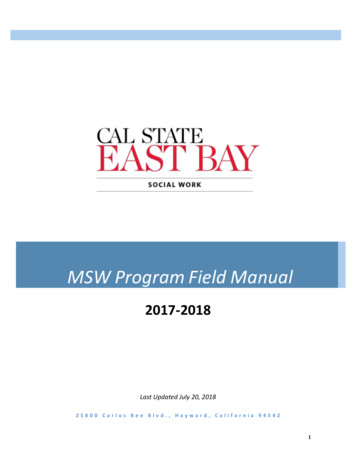
Transcription
MSWProgramFieldManual2017- ayward,California94542
MSW Program Overview . 6Vision, Mission, Values, and Purpose Statement . 6 Vision6 Mission6 Values6 Program Purpose6Program Goals and Student Learning Outcomes . 7 The program’s goals7 Program Objectives:7 Student Learning Outcomes8Field Education Overview . 9 Role of Field9 Foundation (First) Year Overview9 Advanced Year Overview10 Learning Agreement10 Process11 Foundation Year Field Placement11 Advanced Year Field Placement11 Objectives of Fieldwork12MSW Program Curriculum. 14 Foundation Year Curriculum14 Advanced Year Curriculum14 Hayward MSW Curriculum Design16 Oakland MSW Curriculum Design17Description of Roles and Responsibilities . 18 Responsibilities of the University18 Responsibilities of the Field Director18 Responsibilities of the Faculty Field Liaison19 Responsibilities of the Agency20 Responsibilities of the Agency in Risk Management Include:21 Responsibilities of the Field Instructor21 Responsibilities of the Task Supervisor222
Responsibilities of the Student23Evaluation of Fitness for the Profession . 24 FITNESS FOR THE PROFESSION CRITERIA25Fieldwork Basic Policies and Procedures . 27 Eligibility for Enrollment in Fieldwork27 Sequencing in Fieldwork28Practice Requirements . 30 Field Hours Requirements - Hayward Campus30 Field Hour Requirements - Oakland Campus301.Traditional . 312. Extended . 31 Attendance31 Case Assignments32 Days in Field Placement32 Mandated Reporting32 Student Professional Liability Insurance Requirements32 Standard of Care Expected by Students32 Safety33 Strike Policy35 Travel and Travel Expenses35 Unprofessional Behavior35Fieldwork Seminar . 36 Attendance, Participation, and Performance in Seminar36Evaluation of Student Performance in Fieldwork . 36 Evaluating Fieldwork36 Grading Policies for Fieldwork38Disability Accommodations . 39 Accessibility Services39 Disability Considerations for all Internships39 Site Selection39 Requests for Disability Accommodations39Fieldwork Placement Procedures. 403
Students Entering Foundation (First) Year Fieldwork40 Students Entering Advanced (Second) Year Fieldwork43Students At- R isk for Failure of Practicum Courses . 44 The Review Process44 Termination from Fieldwork45Procedures for Implementing Termination from the MSW Program . 46 Academic and Non- A cademic Reasons for Termination47 Grievance Procedures48Procedures to Follow in Addressing Significant Problems in Field Instruction . 48 Level I - Student and Field Instructor Conference49 Possible Outcomes of Level I:49 Level II - Student, Field Instructor and Faculty Field Liaison Conference49 Possible Outcomes of Level II:50 Level III - Student, Field Instructor, Faculty Field Liaison, Field Director Conference51 Level IV - Appeals to the Student Performance Committee51 Emergency Situations51Problems Identified by Student in the Placement . 52 Procedures to Assess the Learning Environment52Change in Placement or Re- Placement . 52Use of Employment Agency as a Fieldwork Site . 53Selection of Fieldwork Agencies and Instructors . 55 Selecting Fieldwork Agencies55 Selecting Field Instructors56Appendices . 58 Appendix A - MSW Program Curriculum58 Appendix A.1 - Hayward Curriculum Design59 Appendix A.2 - Oakland Curriculum Design60 Appendix B - Application for Field Placement61 Appendix C - Learning Agreement66 Appendix C.1 - Title IV- E Foundation Learning Agreement Addendum78 Appendix C.2 - Title IV-E Advanced Learning Agreement Addendum91 Appendix D - Hayward Record of Practicum Hours964
Appendix D.1 - Oakland Record of Practicum Hours Appendix E - Master Field Calendar 2017- 2018100 Appendix F - Hayward Student/Agency Interview Response Form102 Appendix F.1 - Oakland Student/Agency Interview Response Form104 Appendix G - Advanced Year Placement Interest Form106 Appendix H - Employer Placements108 Appendix I - Agency Agreement for Furnishing Fieldwork113 Appendix J - Agency Fact Sheet121 Appendix K - University & Department Policy on Nondiscrimination and Sexual Harassment 125 Appendix L - Accident/Injury Report131 Appendix M - Client Authorization for Taping for Educational Purposes132 Appendix N - Process Recordings134 Appendix O - Field Instructor Checklist139 Appendix P - Student Orientation Checklist140 Appendix Q - Early Concern Notification143 Appendix R - 1 Appendix R.1 Advanced Year (CMH) 1st Progress Report158 Appendix R.2 Advanced Year (CYF) 1st Progress Report180 Appendix S - Foundation Year Mid- Year Progress Report201 Appendix S.1 Advanced Year (CMH) Mid-Year Progress Report214 Appendix S.2 Advanced Year (CYF) Mid-Year Progress Report236 Appendix T Foundation Year Final Progress Report257 Appendix T.1 Advanced Year (CMH) Final Progress Report271 Appendix T.2 Advanced Year (CYF) Final Progress Report284 Appendix U - Student Evaluation of Field Placement297 Appendix V - Student Evaluation of Faculty Field Liaison300 Appendix W - Field Instructor Feedback301 Appendix X - Faculty Field Liaison Evaluation/Agency Field Placement304stProgress Report Foundation Year98145The Department will release an updated MSW Program Field Manual, which will applyto all current students, by mid-Fall semester 2018. Students will be notified and emailedthe updated version, which will also be posted on the department’s website.5
MSW Program OverviewThe California State University East Bay (CSUEB) Master of Social Work program’s philosophy andcurriculum are grounded in the reality of an urban environment. The department of Social Work atCSUEB is strategically established to address the diverse social work needs and problems particularto urban, multicultural and multiracial populations, including issues of poverty, discrimination,racism, sexism, ageism and other forms of injustice.Vision, Mission, Values, and Purpose StatementVisionTo create a cadre of diverse leaders to be social change catalysts who transform oppressive systemsin partnership with communities.Mission"The California State University East Bay MSW program is committed to graduating culturallyresponsive urban social workers in the areas of Children, Youth and Families (CYF) and CommunityMental Health (CMH). Graduates are prepared to address individual, family, group and communityneeds caused by inequalities of class and identity including race, ethnicity, gender, age, (dis)ability,and sexual orientation, as well as other forms of social injustice. Advocacy and social change formthe core of the MSW program.ValuesThe MSW program’s values are based on the National Association of Social Worker’s (NASW’s) Codeof Ethics (revised 2017; f-Ethics/). The corevalues are: ServiceSocial justiceDignity and worth of the personImportance of human relationshipsIntegrityCompetenceProgram PurposeThe California State University East Bay MSW program purposes are: Enhance human wellbeing and alleviate poverty, racism, oppression, and other forms of socialinjustice among the urban disenfranchised and underserved populations in the Bay Area.Enhance well-being, social functioning and interactions of individuals, families, groups,organizations, and communities by involving them in accomplishing goals, developing resources,6
and preventing and alleviating distress.Formulate and implement social policies, services, and programs that meet basic human needsand support the sustainable development of human capabilities.Pursue policies, services and resources through advocacy and political actions promoting socialand economic justice.Develop and use research, knowledge and skills that advance multicultural social work practice.Develop and apply social work practice in the context of diverse cultures, specifically thosedisenfranchised and underserved populations living in urban areas.Program Goals and Student Learning OutcomesThe program’s goals: Educate social workers in their roles as ethical change agents who practice in complex anddiverse communities. Students will develop skills to leverage their leadership role in those publicsocial service organizations charged with responding to societal problems such as poverty,racism, sexism, heterosexism, ageism, family instability, child and adult maltreatment, health andbehavioral health needs, addiction, and urban renewal.Prepare social work practitioners capable of autonomous practice with diverse populations ofindividuals, families, groups, organizations and communities.Prepare social workers who are committed to social justice and human rights while serving,advocating for, empowering and mobilizing client communities to address the needs ofunderserved and oppressed populations,Provide social work graduates with advanced ethical urban practice methodologies and abilitiesto sensitively and competently improve well being in the context of issues of race, culture,ethnicity, class, sexual orientation, disability, health, gender and aging over the lifespan.Prepare social workers who provide research-informed and evidence-based practice, whileengaging in critical self-evaluation in relation to service.Contribute to social work and social welfare through professional leadership and scholarship thatadvances knowledge, practice and values.Program Objectives:To realize its mission and goals, the program strives to meet designated program learning objectives(PLOs). These specify seven abilities that students master in preparing for effective professional socialwork practice. Each objective is followed by a list of educational outcomes. These outcomes areexpressed in terms of knowledge, values and skills that each student is expected to achieve. Complexityand depth of the objectives increase as students progress through the program. The table below outlinesthe seven objectives.7
Student Learning Outcomes Values and Ethics. Uphold the core values and ethical principals and standards of thesocial work profession as codified in the National Association of Social Workers’ Codeof Ethics. Professional Use of Self. Conduct oneself autonomously in the professional social workrole, including understanding personal values and biases and knowing their impact onclients, engaging in ongoing professional development, and exercising use of self in orderto engage and collaborate effectively. Critical Thinking. Use critical thinking skills in the analysis and synthesis of information,(with regard to work with clients, contributing to program development/evaluation,advocacy and other professional social work responsibilities). Applying Theory to Practice. Demonstrate an ability to integrate relevant theoreticalmaterial into field experiences in the student’s area of concentration. This includes theability to articulate such theories with field instructors, field staff and/or interventionteams. Utilizing Evidence- Based Practice. Student has knowledge, skills and understanding of theimportance of applying evidence- -based practices in social work. Advocacy. Advocate for clients, groups and communities in complex cultural, socialand political situations. Diversity. Act with self- -a wareness and knowledge of diverse populations, with thecommitment of providing culturally competent service (cultural humility). Communication. Communicate effectively orally and in writing across diverse client andsocial services systems.8
Field Education OverviewRole of FieldThe fieldwork sequence plays an integral role in the total MSW curriculum. The experience offersan opportunity for students to integrate and apply social work knowledge, practice andintervention skills in a community agency setting under the supervision of a qualified fieldinstructor. A variety of agencies within the region serve as fieldwork placements, reflecting thediversity of social work employment. The selected agencies and field instructors play a major rolein the personal and professional development of the student, providing a range of learningopportunities including direct practice situations, indirect or macro practice situations, orientationto the role of the professional social worker in agencies, and exposure to the dynamic and ever -changing service needs within the agency and the larger community.The fieldwork experience is designed to prepare students for effective practice in diverse,multiracial and multicultural communities and strives to provide new and challenging learningopportunities for the student. The program engages students in supervised direct service activitiesat micro, mezzo and macro levels; provides practice experiences in application of foundationtheory and skills and produces a professionally reflective, self-- evaluating, knowledgeable anddeveloping social worker. Students are prepared for entry into a specialized area of practice, withthe ability to utilize a range of intervention techniques in diverse practice settings, with a varietyof cultural and ethnic populations.Foundation (First) Year OverviewHayward students begin field their first year of the program. Oakland students begin field theirsecond year of the program. Regardless of the program, the student's first year of field isconsidered the "Foundation" year.The foundation placement emphasizes the social workers’ roles in addressing social problems,using effective interviewing skills, understanding the role of self in the helping relationship,performing bio- -p sychosocial assessments, developing intervention plans, evaluating one’s practice,and understanding the systemic context of one’s practice in relation to addressing social problems.MSW students must also demonstrate the ability to establish and maintain effective workingrelationships with individuals from diverse backgrounds and from populations at- -risk. As generalistpractitioners, students must demonstrate their knowledge and skills at three levels of practice:micro, mezzo, and macro.The micro level includes focusing on the individual alone or as part of a family or small group. Atthe micro level, students are introduced to the bio- -psychosocial assessment and learn what type ofinformation is relevant to social work practice and the interviewing techniques needed to obtain it.This involves learning to engage clients, establishing rapport and appropriate boundaries withthem, coupled with clarification of social work roles. The mezzo level includes practice primarilywith families and small groups and involves activities such as facilitation, communication,mediation, negotiation and education. The students are building on the knowledge acquired withindividuals and learning to manage practice with a larger group of individuals or systems accordingto their needs. Macro level practice is directed toward facilitating changes in the larger society or9
in social institutions based on the knowledge that the students have acquired through their earlierfield practicum experiences. Examples of macro practice include advocacy, political action,community organization, and administration of broad- -based social service organizations. Studentscompleting this course will be able to apply the knowledge and skills obtained in the classroom andthe field placement in the work setting.Advanced Year OverviewIn the advanced year (Hayward students' second year; Oakland students' third year) of fieldpracticum, students' professional competence is facilitated through the development of theknowledge and skills needed for culturally competent urban social work practice and advocacy.Students select from two specific areas of concentrations: Children, Youth and Families orCommunity Mental Health. Advanced year fieldwork builds on the skills developed in thefoundation year and focuses on moving students beyond foundation year experiences to morerefined practice skills with an emphasis on a greater level of autonomy and competence. Thisfosters a higher level of social work practice skills facilitated by learning opportunities affordingstudents greater depth, breadth, and specificity across micro, mezzo, and macro practiceareas. Students have the opportunity to practice with increasingly complex client systems so thatthey can refine their knowledge and skill base of the foundation year.The advanced year field practicum promotes essential skills related to professional competenceincluding self-- responsibility, self- -o bservation, self- -correcting practice, and leadership skills. It isexpected that the goals and objects of the advanced learning agreement will describe activitiesfocused on the development of professional competence, such as use of practice skills at the micro,mezzo and macro levels; maintaining self- -a wareness within a variety of practice situations; greaterunderstanding of one’s strengths and the process of one’s own learning; and utilizing values andethics of the profession. The specialized focus of the advanced year field practicum, combined withthe knowledge and skills obtained in the foundation year, provide students with an opportunity toobtain greater professional competence and independence in delivering a variety of services.Learning AgreementThe Learning Agreement sets the guidelines by which the field instructor and student will worktowards addressing the eight core objectives of the field program and acquire the knowledgenecessary to become competent social work practitioners. It is based on the premise each studenthas their own individual work experiences and educational background and that these inconjunction with the opportunities offered by the field instructor and agency will generate a set ofgoals and objectives which will enable the student to optimize their field placement experience.While it is the student‘s responsibility to complete the written document, the content shouldrepresent mutually agreed upon objectives between the Field Instructor and the student. Studentsand Field Instructors are responsible for signing the learning agreements on the dates specified inthe Master Field Calendar (Appendix E). The learning agreement provides a structure for theplacement experience and delineates expectations. Title IV- -E students have an addendum to theirlearning agreement (Appendices C.1, C.2) that specifically addresses the EPAS' core competencies ofthe stipend program.10
ProcessEach student has two fieldwork placements in two different agencies during the course of study.Regardless of the size of the agency and the availability of multiple geographic locations and/orprograms, the agency can be utilized as a fieldwork placement site for only one of the two periodsof fieldwork.Foundation Year Field PlacementHayward students applying to the MSW program complete an Application for Field Placement(Appendix B). This form is submitted with their application packet. Oakland students will be askedto complete this form Spring Quarter (near the end of their first year), after attending the InternFair for their upcoming field placements. In this application, they are asked to select their top fivechoices in a variety of social service areas such as aging, corrections, child welfare, mental health,disabilities and so on. Students are required to complete an interview with a faculty member fromthe field department staff. The students' field application, resume, areas of interest, strengthsand areas of growth are identified. The field faculty liaison will select a placement that will matchthe students' needs and provide a challenging experience that will solidify their foundation year.Field experiences build upon one another to create self- -directed and competent practitioners.The foundation year of fieldwork emphasizes the development of foundation social workpractice skills including relationship development, interviewing and beginning psychosocialassessment, diagnosis and intervention skills.Advanced Year Field PlacementDuring the advanced year, the student is expected to develop increased insight and depth ofunderstanding of agency and/or client systems and social work practice skills in relation to theirchosen concentration area (CYF or CMH). Students attend the Intern Fair in the Winter Quarterand have an opportunity to meet and interview with various agencies throughout the area.Students with extensive direct practice (10 years) experience may petition to select a placementsite that offers a more intensive macro experience where they will further their skills inadministrative activities, including organizational development, program planning and programevaluation.The fieldwork experience is tailored to the individual student’s needs in an ongoing assessmentprocess between the student, field instructor and liaison. During the first weeks of placement,the student and field instructor develop a learning agreement (Appendix C). This documentoutlines students' learning goals and strategies to meet these goals and an evaluation plan toconfirm goal accomplishment.The learning agreement includes activities and experiences relating to the seven fieldobjectives based on foundation or advanced year curriculum. These involve skill acquisitionin areas of: 1) values and ethics; 2) professional use of self; 3) critical thinking; 4) applyingtheory to practice; 5) advocacy; 6) diversity; and7) communication.11
Objectives of Fieldwork1ST YEAR FOUNDATION OBJECTIVES2ND YEAR ADVANCED OBJECTIVES1. VALUES AND ETHICS1. VALUES AND ETHICSDemonstrate a beginning understanding of, andDemonstrate a firm understanding of, and acommitment to uphold the core values, ethicalcommitment to uphold the core values, ethicalprinciples and ethical standards of the socialpr incipl es and ethical standards of the socialwork profession as codified in the NASW Code ofwork profession as codified in the NASW Code ofEthics.Ethics.2. PROFESSIONAL USE OF SELFDemonstrate a beginning understanding ofprofessional social work behavior. This includesabilities such as: distinguishing professionalversus personal roles; the elevation of serviceto others above self- -interest; awareness ofpersonal strengths and limitations; flexibility inassuming social work roles to cope withchange; using supervision effectively; self -reflection; respecting standards of timeliness;appropriate dress and professional boundaries.2. PROFESSIONAL USE OF SELFConduct self with increased autonomy in theprofessional social work role in the placementsetting. This includes abilities such as:understanding personal values and biases andknowing their impact on clients, a commitment tothe ongoing developmentof professional knowledge and skills, andthe use of self effectively in the chosen areaof concentration.3. CRITICAL THINKINGShow an ability to apply early critical thinkingskills to challenges and issues that arise in fieldplacement. This includes: understanding thedifferences between verifiable facts and valueclaims; critical examination of arguments andevidence; an openness to examine one’s ownpractice, using research to inform practice, anda commitment to providing evidence- - basedpractice when possible.3. CRITICAL THINKINGDemonstrate the ability to use critical thinkingskills in the field setting through successful analysisand synthesis of information, application ofevidence- - based practice, and a willingness tomodify plans of intervention accordingly.4. APPLYING THEORY TO PRACTICEShow a basic ability to apply community -based, generalist practice perspectives tofield situations utilizing evidenced basedpractice.4. APPLYING THEORY TO PRACTICEDemonstrate an ability to integrate relevanttheoretical materials into field experiences in thestudent’s area of concentration. This includes theability to articulate such theories with fieldinstructors, field, staff and/or intervention teams.5. ADVOCACYBegin to advocate for underserved anddisenfranchised clients or groups in theassigned field placement.5. ADVOCACYDemonstrate a commitment to and the ability toadvocate for clients, groups and/or communitiesin increasingly complex situations specific to thestudent’s area of concentration.12
6. DIVERSITYApproach fieldwork with an awareness of ownpersonal cultural values and biases; an opennessto self- -reflection; and an interest in expandingtheir culturally competent practice skills.6. DIVERSITYConduct self with self- -awareness and increasedknowledge of diverse populations with thecommitment to provide culturally competentservices and delivery.7. COMMUNICATIONDemonstrate the ability to respectfully formprofessional relationships with andcommunicate to clients, groups and staff inthe field practicum, as well as maintain basicdocumentation requirements of the agency.7. COMMUNICATIONDemonstrate a professional level of written andoral communication relevant to the concentrationand the ability to communicate across diverseclient systems.13
MSW Program CurriculumFoundation Year CurriculumMSW Program Curriculum Core Requirements(44 units) Foundation Year Required CoursesSW 6000, 6001 Human Behavior and Social EnvironmentI, II (4, 4) SW 6010 Race, Gender and Inequality in SocialWork Practice (4) SW 6011. 6012, 6013 GeneralistPractice I, II, III (4, 4, 4)SW 6020, 6021, 6022 Field Instruction I, II, III (4, 4, 4)SW 6030 Social Welfare Policy: History andPhilosophy (4) SW 6032 Social Welfare Policy:Research (4)Advanced Year CurriculumConcentrations (28- 34 units) Advanced Year Required CoursesChildren, Youth & FamilySW 6500 Advanced Micro Practice: Children, Youth &Family (4) SW 6510 Advanced Mezzo Practice: Children,Youth & Family (4) SW 6520 Advanced Policy Practice:Children, Youth & Family (4) SW 6530, 6531, 6532 FieldInstruction IV, V, VI (4, 4, 4)SW 6932 Quantitative and Qualitative Analysis: (4)SW 6935 Program Evaluation: (4) (Students choosing to complete their CapstoneExperience with 8 units of SW 6910 University Thesis are not required tocomplete this course.)Community Mental HealthSW 6405 Community Mental Health Seminar (1)SW 6505 Advanced Micro Practice: Community MentalHealth (4) SW 6515Advanced Mezzo Practice: CommunityMental Health (4) SW 6525 Advanced Policy Practice:Community Mental Health (4) SW 6530, 6531, 6532 FieldInstruction IV, V, VI (4, 4, 4)SW 6932 Quantitative and Qualitative Analysis: (4)SW 6935 Program Evaluation: (4) (Students choosing to complete their CapstoneExperience with 8 units of SW 6910 University Thesis are not required tocomplete this course.)14
Electives (8 units)- 2nd Year SW 6550 Social Work Psychosocial Rehabilitation (4) SW 6552 Legal Issues in Social Work Practice (4) SW 6553 Assessment and Treatment of Substance Abuse (4) SW 6554 Occupational Social Work (4) SW 6555 School Social Work (4) SW 6556 Human Sexuality and Social Work (4) SW 6558 Supervision and Staff Development (4) SW 6559 Youth and the Justice System (4) SW 6560 Family Violence Across the Lifespan (4) SW 6561 Advanced Psychosocial Assessment and Diagnosis (4) SW 6964 Practice with Lesbian, Bi-Sexual, Gay, Transgendered and Questioning Populations (4) SW 6965 Practice with Latino Populations (4) SW 6966 Social Work and Public Mental Health Across the Lifespan (4)Capstone Experience (4- 8 units) SW 6909 Departmental Thesis (4) or SW 6910 University Thesis (4, 4) or SW 6959 Integrative Seminar (4)15
Hayward MSW Curriculum Design1T QTRSW 6000SW 6010SW 6011SW 6020FALLHuman Behavior and Social Environment I (Child/Adolescent)Race, Gender and Inequality in Social Work PracticeGeneralist Practice IField Instruction I44442ND QTRSW 6001SW 6012SW 6021SW 6030WINTERHuman Behavior and Social Environment II (Adult)Generalist Practice IIField Instruction IISocial Welfare Policy: H
The California State University East Bay (CSUEB) Master of Social Work program's philosophy and curriculum are grounded in the reality of an urban environment. The department of Social Work at . The California State University East Bay MSW program purposes are: Enhance human wellbeing and alleviate poverty, racism, oppression, and other .
